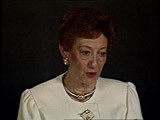You searched for: 博必发娱乐彩金【Aurl:www.8233066.com】送888元.movy
<< Previous | Displaying results 21-30 of 37 for "博必发娱乐彩金【Aurl:www.8233066.com】送888元.movy" | Next >>
-
Flora Mendelovicz
ID CardFlora's Romanian-born parents immigrated to Antwerp, Belgium, in the late 1920s to escape antisemitism. Flora's father owned a furniture workshop. Antwerp had an active Jewish community. There were butcher shops, bakeries, and stores that sold foods which were prepared according to Jewish dietary laws. Flora was the oldest of three girls, and the family spoke Yiddish at home. 1933-39: When Flora arrived for her first day of kindergarten at public school, she was shocked to learn that there were other…
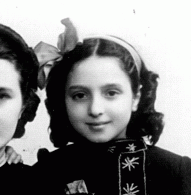
-
Dorotka (Dora) Goldstein Roth describes retaliation against women for an escape from Stutthof
Oral HistoryAfter the Germans invaded Poland in 1939, Dora's family fled to Vilna, Lithuania. When the Germans occupied Vilna, Dora's father was shot and the rest of the family was confined in the Vilna ghetto. Dora, her sister, and her mother were deported to the Kaiserwald camp in Latvia and then to the Stutthof concentration camp near Danzig. Her mother and sister perished in Stutthof. Dora herself was shot immediately before liberation, but she survived.
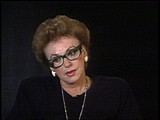
-
Boleslaw Brodecki describes hangings in a labor camp and their impact on the prisoners
Oral HistoryBoleslaw and his older sister were raised in a Jewish section of Warsaw. The Germans attacked Warsaw in September 1939. Boleslaw's father did not want to leave his ill relatives behind, so Boleslaw and his sister escaped on a train heading for the Soviet border. The Germans invaded Soviet territories in 1941, and in 1942 Boleslaw was imprisoned in a forced-labor camp. He was deported to the Theresienstadt ghetto, where he was liberated by Soviet forces in 1945.
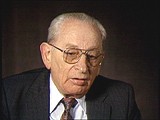
-
US veteran Raymond Buch describes forcing civilians to bury the dead
Oral HistoryAs a US Army sergeant, Raymond fought in the Battle of the Bulge. In May 1945, his unit was deployed to the Mauthausen camp in Austria to bulldoze mass graves for the victims. He watched as German civilians, on US orders, hauled bodies to the mass graves. He also saw stronger camp survivors pull clothes off their weaker counterparts to replace their own tattered uniforms. Raymond went on to Mauthausen's Ebensee camp and Gusen, guarding SS men.
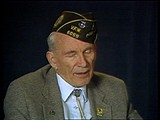
-
Beno Helmer describes conditions in the Lodz ghetto
Oral HistoryAs a young man, Beno used his foreign language skills to land small movie roles. He and his family were deported to the Lodz ghetto, where they struggled daily to find food. In the underground, Beno became an expert at derailing trains. The family was sent to Auschwitz and was separated. All but Beno and one sister, whom he found after the war, died. Beno survived a series of camps and later helped to track war criminals.
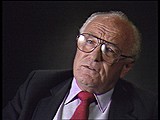
-
Hans Heimann describes internment in Italy
Oral HistoryThe Germans annexed Austria in March 1938. In 1939, Hans fled first to Hungary and then to Italy. He and his parents were interned in various towns. Hans's father became ill and died in 1940. In 1943, Hans and his mother were warned of German plans to deport Jews from Italy to Poland. They moved to smaller towns until liberation by the British in August 1943. Hans worked as an interpreter for the Allies until 1945, when he worked for the American Jewish Joint Distribution Committee and helped resettle…
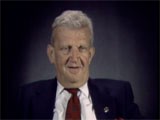
-
Oskar Schindler
ArticleOskar Schindler's actions to protect Jews during the Holocaust saved over 1,000 Jews from deportation. Learn more about Schindler's List.
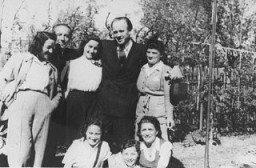
-
Writing the News
ArticleShortly after taking power in January 1933, Adolf Hitler and the Nazis took control of German newspapers, detailing how the news was to be reported.
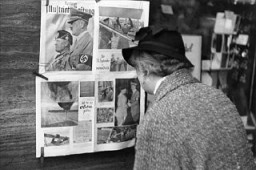
-
Oranienburg
ArticleThe Oranienburg concentration camp was established as one of the first concentration camps in Nazi Germany on March 21, 1933. Learn more
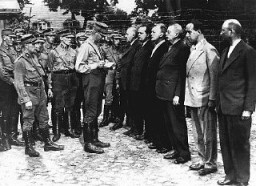
-
Madeline Deutsch describes adjusting to social and educational life after the war
Oral HistoryMadeline was born into a middle class family in an area of Czechoslovakia that was annexed by Hungary in 1938-1939. Her father worked out of their home and her mother was a homemaker. Madeline attended high school. In April 1944 her family was forced into a Hungarian ghetto. The family lived in the ghetto for two weeks before being transported to Auschwitz. Madeline and her mother were separated from her father and older brother. Neither her father nor brother survived the war. A week after arriving in…
